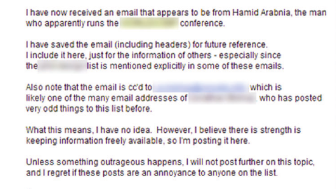When a paper was retracted earlier this year with an opaque notice, we set out to figure out why. We’re still not entirely clear of the reason, but we’ve uncovered one aspect of the paper that raised objections from another researcher: The paper, on internet trolling, included an email he sent without his permission.
The retraction sparked our interest, both because of the journal’s opaque reasoning — saying the paper “does not fit” with the journal — and because the author (Jonathan Bishop, CEO of an independent media company called Crocels) has taken preliminary steps to sue the publisher of the Journal of Homeland Security and Emergency Management.
Here’s some of what happened before all that took place: When mechanical engineer Filippo Salustri discovered the paper included a screenshot of an email he sent to a listserv — along with his email address — his university (Ryerson in Canada) asked the publisher to retract the paper. De Gruyter re-reviewed the paper and retracted it, issuing the vague notice.
Salustri explained that the paper contains a figure with a picture of an email message:
The message has blanked out various names, but leaves mine – including my email address, and therefore my employer – visible. Because it is an image, googling my name will not find this paper.
Mr. Bishop never sought my permission to use my name or email address in his paper. The email message shown is (a) taken out of context, and (b) part of an online discussion on a mailing list at JISCmail that has since been deleted, and in which Mr. Bishop himself was a participant. The result is that Mr. Bishop’s paper is entirely misrepresentative of me and, by extension, my institution.
On consultation with my institution and their legal counsel, the decision was made that my institution would pursue retraction of the paper. De Gruyter informed us that they would have the paper re-evaluated by third party. Eventually, they informed us that the evaluation had been in fact conducted, and that the paper would be retracted as a result of that evaluation.
We asked Bishop to comment on Salustri’s allegation that he published the email without permission. He said:
I cannot comment on that until legal proceedings in relation to another case are concluded…However, there is nothing stopping you using what is already in the public domain: http://news.crocels.com/facts-
data-information/filippo- salustri/
Earlier, Bishop forwarded us an email from Alex Greene, a Senior Editorial Director at De Gruyter, which stated a few reasons why the journal was retracting the paper, such as factual errors and the fact it reads like three “different partial articles;” the note doesn’t mention anything about Salustri’s email address.
Here’s a screenshot (Figure 1 in the paper) that includes Salustri’s email; the same blurring appears in “Transforming the UK Home Office into a Department for Homeland Security: Reflecting on an Interview with a Litigant Defending Against Online Retaliatory Feedback in the US,” and we’ve cut out the personal information:

In the text describing Figure 1, the paper mentions an “interviewee” and “troller” who accused the WORLDCOMP conference of being “fake.” The individual isn’t named, but Salustri has been accused by WORLDCOMP of posting “defamatory and damaging comment.”
I will say this: I was never approached by Mr. Bishop for an interview. If Mr. Bishop was “interviewing” me during that time on JISCmail, he did so *without* informing me that he was in fact conducting an interview. Nor did Mr. Bishop’s online exchanges with me (or anyone else involved at the time) appear in a form I would ever associate with “being interviewed.”
In the context of the paper, the figure implies that I have acted inappropriately. In a publicly archived email message, (https://www.jiscmail.ac.uk/cgi-bin/webadmin?A2=ind1505&L= PHD-DESIGN&F=&S=&P=164269), the author, Jonathan Bishop, used that paper of his to accuse me of being a “cyber-terrorist.”
Greene has told us previously that De Gruyter “will not have any out of court comments.”
Like Retraction Watch? Consider making a tax-deductible contribution to support our growth. You can also follow us on Twitter, like us on Facebook, add us to your RSS reader, sign up on our homepage for an email every time there’s a new post, or subscribe to our new daily digest. Click here to review our Comments Policy. For a sneak peek at what we’re working on, click here.

As described, I can see no reason why publication of the email was unlawful [yes, even when showing Salustri’s email address]. Publication was almost undoubtedly a fair use of the email [negating copyright infringement] and Salustri has no privacy interest in his email address — especially one he uses for work.
Agree. His name and email were visible in that listserv discussion thread, where he had no expectation of privacy.
“… an e-mail he sent without his permission”? He sent an e-mail without his permission? Too many pronouns….
… or, unclear wording.
However, there is nothing stopping you using what is already in the public domain: http://news.crocels.com/facts-data-information/filippo-salustri/
“I publicised the correspondence on my own website, therefore it is in the public domain now and it’s OK for me to distribute it.”